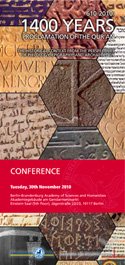
According to Islamic tradition a prophet, Muhammad, appeared in the Arabian town of Mekka in the year 610. For a period of little more than 20 years Muhammad proclaimed poetical texts, ‘suras’, that he had received as revelations, and through his preaching set up a community. These ‘suras’, which were later codified to form the Qur’an, have lived on as the very heart of Islamic self-expression. But what do we know about the context of the Qur’an, the Arabian Peninsula, on the eve of the emergence of Islam? Islamic tradition tends to view the pre-Islamic period of Arabian history as a „time of ignorance“(‘asr al-jâhilîya), a label that has severely handicapped research on the history of Arabia before Islam. Western research has tended to view the Qur‘an as a mere compilation, a text simply grafted on Jewish and Christian traditions. In order to take seriously the desideratum of reading the Qur‘an as a message adressed to a Late Antique audience, one has to read
the text against its historical and cultural background. Such an attempt to reconnect the text to its first listeners is made in the Corpus Coranicum project of the Berlin-Brandenburg Academy of Sciences and Humanities.
The conference assembles specialists from the fields of philology, archaeology, and epigraphy in order to discuss the following questions: What kind of evidence concerning the Qur’an’s historical context can be gleaned from these disciplines? What are the scholarly instruments to determine and to narrate the history of the period immediately before Islam? Is archaeological evidence compatible with historical knowledge derived from Nabatean and South Arabian stone inscriptions? How are descriptions of pre-Islamic Arabia in Arabic sources of the 8th and 9th centuries to be evaluated? In 2011 the research cooperation „COR ANICA: Du contexte au texte”, sponsored by the German DFG and the French ANR , between the Berlin-Brandenburg
Academy of Sciences and Humanities and the Académie des Inscriptions et Belles-Lettres will start its work on the relationship between philology and material evidence for the environment of the text of the Qur’an.
PROGRAM
09.30
Introduction
Michael Marx
Berlin
10.00
The Late Antique Qur‘an
Angelika Neuwirth
Berlin
10.30
Arabia in Late Antiquity
Robert Hoyland
Oxford
11.00
Discussion
Coffee break
12.00
The Linguistic Situation in the Pre-Islamic Arabian Peninsula According to Epigraphical Evidence
Christian Robin
Paris/Aix-en-Provence
12.30
Pre-Islamic Arabia: its Cultural, Economic, and Religious Landscape According to Archaeological Evidence
Ricardo Eichmann
Berlin
13.00
Discussion
Lunch break
14.30
Zur Geschichte der Kaaba
Barbara Finster
Bamberg
15.00
The Religious Map of Pre-Islamic Arabia According to Arabic Sources from Islamic Times
Tilman Seidensticker
Jena
15.30
Ibn al-Kalbi on Paganism and Christianity in Pre-Islamic Arabia
Ernst Axel Knauf
Bern
16.00
Final Discussion
Die Konferenzsprache ist Englisch.

